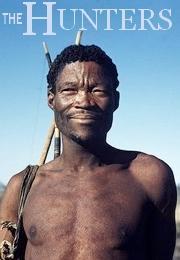| The Hunters | |
|---|---|
 | |
| Directed by | John Marshall in collaboration with Robert Gardner |
| Narrated by | John Marshall |
| Cinematography | John Marshall |
| Edited by | John Marshall |
| Production company | Peabody Museum of Archaeology and Ethnology |
| Distributed by | Documentary Educational Resources |
| Release date |
|
| Running time | 72 minutes |
| Country | United States |
| Language | English |
| Part of a series on the |
| Anthropology of art, media, music, dance and film |
|---|
 |
| Basic concepts |
Case studies
|
| Museums |
| Related articles |
| Major theorists |
| Social and cultural anthropology |
The Hunters is a 1957 ethnographic film that documents the efforts of four !Kung men (also known as Ju/'hoansi or Bushmen) to hunt a giraffe in the Kalahari Desert of Namibia. The footage was shot by John Marshall during a Smithsonian-Harvard Peabody sponsored expedition in 1952–53. In addition to the giraffe hunt, the film shows other aspects of !Kung life at that time, including family relationships, socializing and storytelling, and the hard work of gathering plant foods and hunting for small game.
The film was produced at the Film Study Center of the Peabody Museum at Harvard University by John Marshall in collaboration with Robert Gardner. It won the 1957 Robert J. Flaherty Award for best documentary film from the City College Institute of Film Technique, New York, and was named to the US National Film Registry by the Librarian of Congress in 2003 for its "cultural, aesthetic, or historical significance". The Hunters was preserved in 2000 with a grant from the National Film Preservation Foundation.
In his book At The Edge of History, William Irwin Thompson uses the structure of The Hunters to model the universal form of conflict in values in human institutions.
Plot
| This article needs a plot summary. Please add one in your own words. (January 2024) (Learn how and when to remove this message) |
See also
References
- "The Hunters (1957) - Documentary Educational Resources". Retrieved 2022-10-26.
- "Elizabeth Marshall Thomas". OneWorld Magazine.
- 'The Hunters' wins '57 Flaherty Award. New York Times, 21 March 1957, p. 16
- "Librarian of Congress Adds 25 Films to National Film Registry" (Press release). Library of Congress. December 16, 2003.
- "Complete National Film Registry Listing". Library of Congress. Retrieved 2020-11-02.
- "Guide to the John Marshall Ju/'hoan Bushman Film and Video Collection, 1950-2000" (PDF). Human Studies Film Archives, Smithsonian Institution. Archived from the original (PDF) on 2009-07-06.
- Thompson, William (1990). At The Edge of History. Lindisfarne Press. p. 93. ISBN 0-940262-32-0.
The historical past with which I wish to begin is not the distant past of the Stone Age, but the archaic present as seen in a classic ethnographic film, John Marshall's The Hunters. This film about the Bushmen of South Africa contains not so much the material I wish to discuss as the structure on which I wish to support a model of the universal form of conflict in values in human institutions.
External links
- The Hunters at IMDb
- The Hunters at Documentary Educational Resources
- The Hunters essay by Daniel Eagan in America's Film Legacy: The Authoritative Guide to the Landmark Movies in the National Film Registry, A&C Black, 2010 ISBN 0826429777, pages 541-542
This article about an American documentary film is a stub. You can help Misplaced Pages by expanding it. |
- 1957 films
- United States National Film Registry films
- American documentary films
- BAFTA winners (films)
- Anthropology documentary films
- Films about hunter-gatherers
- Films shot in Namibia
- 1950s English-language films
- 1950s American films
- Films set in the Kalahari Desert
- English-language documentary films
- American documentary film stubs